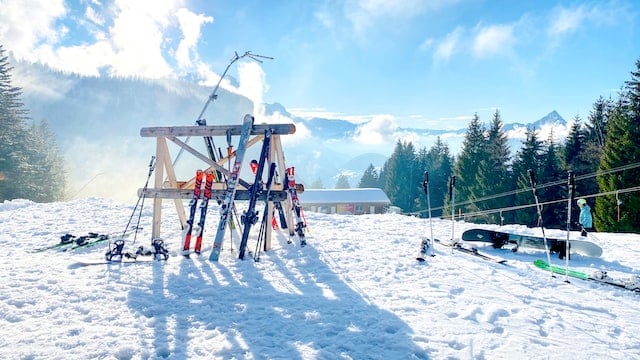The German words you need to talk about cold weather in Switzerland

How can you describe cold weather in German (and Swiss German)? With temperatures dipping recently, here are some essential words you’ll likely be hearing or using in winter.
Firstly, it's important to know that the weather is a safe small talk topic in Switzerland. The Swiss are always happy to complain about whether it's freezing outside or blazing sunshine.
For that reason, it's worth brushing up on your weather vocabulary so you can break the ice with your German-speaking (and Swiss German) colleagues and friends.
Bitterkalt
This compound word is pretty straightforward when translated into English - bitterly cold. It's a great word to use when the mercury falls below freezing, as it has in much of Switzerland recently.
Use it like this:
In Basel ist es bitterkalt
It's bitterly cold in Basel.
READ ALSO: Geneva and Lausanne activate their extreme cold plan
Saukalt/Schweinekalt
Both of these words can be used in the same way as “bitterkalt” but literally translate as “pig cold”.
The terms have existed in German for many years, supposedly referring to the low temperatures needed to store meat outdoors - at which point farmers would typically slaughter their pigs for the winter.
“Saukalt” and “Schweinekalt” have a slightly vulgar tone, equivalent to “damned cold” or “bloody cold” in English.
Use it like this:
I don't want to go to the cinema, it's damn cold.
Ich habe keine Lust, ins Kino zu gehen, es ist saukalt.
 Skiing in Schwyz, Switzerland in winter 2022. Photo by Yves Scheuber on Unsplash
Skiing in Schwyz, Switzerland in winter 2022. Photo by Yves Scheuber on Unsplash
Arschkalt
Sometimes it’s just too cold to mince your words. In this case, German speakers might say it is “arschkalt” - literally "ass cold" (or bloody cold in English).
Mein Gott, es ist arschkalt draußen!
My God, it’s freezing outside!
Scheißwetter
One of the most common ways to complain about the weather in German is by using the word “Scheißwetter” (shit weather), which means horrible weather. Even though the word is used colloquially, it is still listed in the German dictionary Duden, and defined as “very unpleasant weather”.
Use it like this:
Was für ein Scheißwetter heute.
What shitty weather today.
READ ALSO: The three important Swiss driving rules for when it snows
Es regnet Bindfäden
But temperatures below freezing (in the “Minusbereich”) aren’t the only hallmarks of a European winter. Rain is rarely far away, and when it’s pouring down, German speakers might exclaim “Es regnet Bindfäden!”, literally “It’s raining strings!”
Some Swiss German words for the winter:
Of course, in German-speaking areas of Switzerland, Swiss German dialects are spoken.
One word for cold that you might often hear is “chalt”, while “iischalt” is icy cold.
In mountainous areas, people might even be “iigschneit” (snowed in) during winter.
There’s also a special Swiss German word for when a lake freezes over… “Seegfrörni”.
READ ALSO: Five places to learn (Swiss) German for free in Zurich
Es gibt kein schlechtes Wetter, nur schlechte Kleidung
That said, there’s only so much complaining you can do about the weather. Typically, the Swiss tend to wrap up in warm in waterproofs and brave winter storms regardless, leading to one final favourite German language saying:
Es gibt kein schlechtes Wetter, nur schlechte Kleidung.
There is no bad weather, just the wrong clothing.”
Don't forget your Winterjagge (winter coat)!
Comments
See Also
Firstly, it's important to know that the weather is a safe small talk topic in Switzerland. The Swiss are always happy to complain about whether it's freezing outside or blazing sunshine.
For that reason, it's worth brushing up on your weather vocabulary so you can break the ice with your German-speaking (and Swiss German) colleagues and friends.
Bitterkalt
This compound word is pretty straightforward when translated into English - bitterly cold. It's a great word to use when the mercury falls below freezing, as it has in much of Switzerland recently.
Use it like this:
In Basel ist es bitterkalt
It's bitterly cold in Basel.
READ ALSO: Geneva and Lausanne activate their extreme cold plan
Saukalt/Schweinekalt
Both of these words can be used in the same way as “bitterkalt” but literally translate as “pig cold”.
The terms have existed in German for many years, supposedly referring to the low temperatures needed to store meat outdoors - at which point farmers would typically slaughter their pigs for the winter.
“Saukalt” and “Schweinekalt” have a slightly vulgar tone, equivalent to “damned cold” or “bloody cold” in English.
Use it like this:
I don't want to go to the cinema, it's damn cold.
Ich habe keine Lust, ins Kino zu gehen, es ist saukalt.

Arschkalt
Sometimes it’s just too cold to mince your words. In this case, German speakers might say it is “arschkalt” - literally "ass cold" (or bloody cold in English).
Mein Gott, es ist arschkalt draußen!
My God, it’s freezing outside!
Scheißwetter
One of the most common ways to complain about the weather in German is by using the word “Scheißwetter” (shit weather), which means horrible weather. Even though the word is used colloquially, it is still listed in the German dictionary Duden, and defined as “very unpleasant weather”.
Use it like this:
Was für ein Scheißwetter heute.
What shitty weather today.
READ ALSO: The three important Swiss driving rules for when it snows
Es regnet Bindfäden
But temperatures below freezing (in the “Minusbereich”) aren’t the only hallmarks of a European winter. Rain is rarely far away, and when it’s pouring down, German speakers might exclaim “Es regnet Bindfäden!”, literally “It’s raining strings!”
Some Swiss German words for the winter:
Of course, in German-speaking areas of Switzerland, Swiss German dialects are spoken.
One word for cold that you might often hear is “chalt”, while “iischalt” is icy cold.
In mountainous areas, people might even be “iigschneit” (snowed in) during winter.
There’s also a special Swiss German word for when a lake freezes over… “Seegfrörni”.
READ ALSO: Five places to learn (Swiss) German for free in Zurich
Es gibt kein schlechtes Wetter, nur schlechte Kleidung
That said, there’s only so much complaining you can do about the weather. Typically, the Swiss tend to wrap up in warm in waterproofs and brave winter storms regardless, leading to one final favourite German language saying:
Es gibt kein schlechtes Wetter, nur schlechte Kleidung.
There is no bad weather, just the wrong clothing.”
Don't forget your Winterjagge (winter coat)!
Join the conversation in our comments section below. Share your own views and experience and if you have a question or suggestion for our journalists then email us at [email protected].
Please keep comments civil, constructive and on topic – and make sure to read our terms of use before getting involved.
Please log in here to leave a comment.